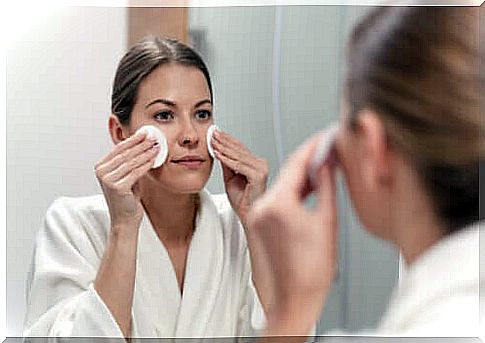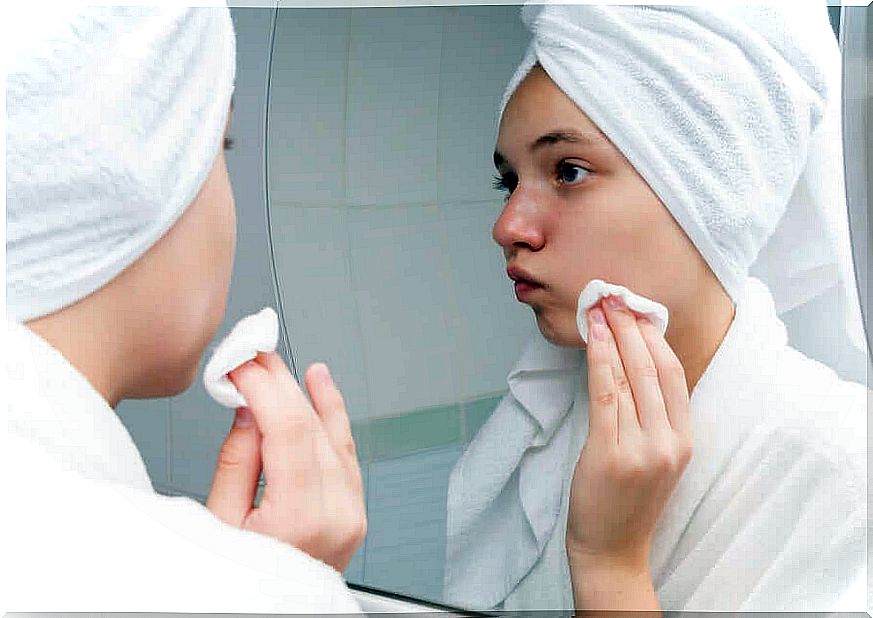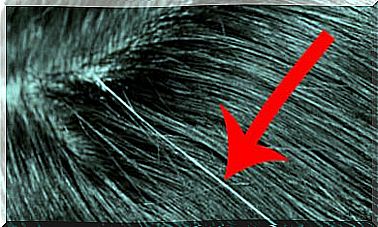Facial Cleansing With Apple Cider Vinegar: Is That Recommended?
Facial cleansing with apple cider vinegar has become popular as a cosmetic treatment with many advantages. But some dermatologists advise careful use of this ingredient. We tell you what you should know about it.

A facial cleansing with apple cider vinegar are attributed many beneficial properties. According to popular literature, regular use leads to the elimination of skin marks, wrinkles, acne and other blemishes. In addition , some believe this treatment is also effective for skin conditions such as eczema or fungal infections. But how much truthfulness is there in such statements?
Although the use of apple cider vinegar for facial cleansing and skin care is often recommended, you should know that the effects of apple cider vinegar are not quite as beneficial and harmless as some people describe them. In fact, due to its composition, it can be quite aggressive and irritating, especially for people with sensitive skin.
Facial Cleansing With Apple Cider Vinegar: What You Should Know
Apple cider vinegar is a product obtained from fermenting apples with yeast and beneficial bacteria. During this process, an active ingredient known as acetic acid is created, which some studies have shown to have antimicrobial and antifungal activity.
Apple cider vinegar also contains substances like malic acid, which, according to a study published in the journal Molecules , belong to the group of alpha hydroxy acids (AHAs), which are known for their health benefits (when used in low concentrations). Is it advisable to clean the face with apple cider vinegar or not?
At the moment, there is insufficient scientific evidence on the effects of apple cider vinegar on the skin. As certified dermatologist Raechele Cochran Gathers explains in an article in Real Simple magazine , most claims about apple cider vinegar and its effects on the skin are only anecdotal.
For this reason, it should be used with caution, especially on sensitive skin. In addition, Gathers points out that apple cider vinegar should definitely be used diluted with water, as it is too acidic in itself and can be aggressive to the skin. But even diluted, face cleansing with apple cider vinegar is not suitable for everyone.
While some people report their positive experiences with this treatment, there are others who have suffered skin irritation and even burns after using it. In the absence of solid scientific evidence and evidence of the safety and effectiveness of facial cleansing with apple cider vinegar, it is imperative that you consult a dermatologist before using it.

What Can Apple Cider Vinegar Do For Your Skin?
Although the evidence is currently quite limited, it is believed that using apple cider vinegar can help relieve symptoms of acne, dandruff, and other dermatological problems. Of course, you should never undergo this treatment without first consulting a doctor. In addition, the vinegar must necessarily be diluted with water.
According to Gathers , the acidity of apple cider vinegar has positive effects on skin conditions like eczema. In this context, she explains that skin with eczema has a higher pH, which increases the risk of infection. While there is no evidence, it is believed that due to its acidic compounds, vinegar may help normalize the pH of these skin types.
On the other hand, as we mentioned earlier, some of the acidic substances belong to the alpha hydroxy acids (AHA). According to a study published in the journal Clinical, Cosmetic, and Investigational Dermatology , these acids are helpful in exfoliating, lightening, and smoothing the skin.
Safe Face Cleansing With Apple Cider Vinegar, How Does It Work?
For most people, using diluted apple cider vinegar to cleanse your face is harmless. However, you should always do a test on a small area of skin before applying this treatment to the entire face.
If you experience reactions such as dryness or irritation, the best practice is to rinse the vinegar with plenty of water and not repeat the use of apple cider vinegar. It is also advisable not to cleanse your face with apple cider vinegar if you have sensitive skin. If you have any questions about the best facial cleanser for you, the best thing to do is to consult a dermatologist.
The dermatologist is also responsible for choosing a treatment for acne, eczema, or any other skin disease. While diluted apple cider vinegar could potentially have beneficial effects on these skin conditions, it is by no means a substitute for treatment prescribed by your doctor.

ingredients
- 1 tablespoon of organic apple cider vinegar (10 ml)
- 1/2 glass of water (100 ml)
Using apple cider vinegar to cleanse your face
- First, you need to dilute the apple cider vinegar with the water.
- Then you dip a cotton ball in the liquid and rub it over your face with gentle movements.
- Leave on for 20 minutes and rinse off.
- Repeat this treatment 2 to 3 times a week before bed.
Recommendations for Choosing a Good Apple Cider Vinegar
Apple cider vinegar comes in different qualities. When it comes to taking care of your skin, it is important to use unrefined, unpasteurized organic apple cider vinegar . Because these variants contain substances that are important for the care of your facial skin. You can recognize this apple cider vinegar by the fact that there is cloudy sediment in the bottle.
Is Apple Cider Vinegar Facial Cleansing Safe?
There is currently no concrete answer to this question. It is known that apple cider vinegar contains substances that can support facial care in low concentrations. However, there have been reports of people experiencing irritation and burns after using this product. Therefore, this treatment is not recommended if you are sensitive.
In general, it is good to see a dermatologist to check the condition of your skin. If you suffer from ailments like acne or eczema, the professional is the one to judge whether it is good to use this ingredient or not. In addition, he will prescribe you a treatment that is precisely tailored to your specific individual case. You shouldn’t forget that!









